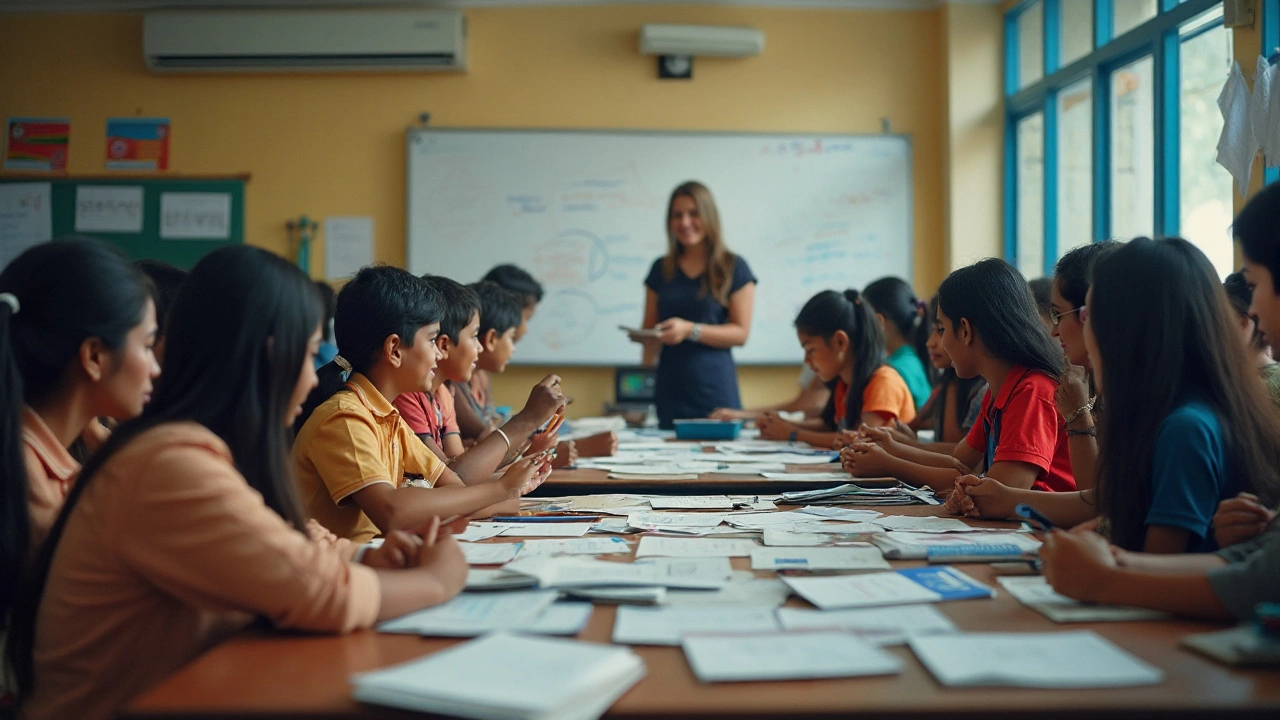Evaluating the Best Global Education: A Focus on CBSE Syllabus
 Nov, 24 2024
Nov, 24 2024
The Central Board of Secondary Education, commonly known as CBSE, is a well-regarded educational board in India, which has gained respect on a global scale. Many are curious to know what sets this curriculum apart from others and why it consistently attracts attention worldwide. With a focus on developing analytical skills and fostering critical thinking, the CBSE syllabus offers students an educational framework that's both rigorous and holistic.
This article is your guide to understanding the nuances of CBSE. Whether you're a parent seeking the best for your child's education or an educator exploring effective teaching strategies, the insights here will prove invaluable. Delve into the distinctive features of CBSE, compare it with other internationally recognized curricula, and discover tips on how to make the most out of what it has to offer.
- Understanding the CBSE Syllabus
- Key Features of the CBSE Curriculum
- CBSE in the Global Education Landscape
- Comparative Analysis with Other Syllabi
- Tips for Maximizing CBSE Benefits
Understanding the CBSE Syllabus
Diving into the heart of the CBSE syllabus, one uncovers a system that emphasizes a balanced blend of academic rigor and creativity. Established to cater to the educational needs of students across diverse backgrounds, CBSE, or Central Board of Secondary Education, is a board of education recognized by the Indian government that conducts exams for over 21,000 schools in India and abroad. This prominence is not without reason. The syllabus is meticulously designed to not only cover a wide range of subjects but to ensure clarity and depth in each topic. For instance, in mathematics, while the fundamental concepts remain consistent, what changes is the focus on problem-solving and critical analysis, ensuring students are not just rote learners but thinkers capable of applying concepts in real-world scenarios.
The CBSE curriculum places a strong emphasis on science and mathematics, often considered the backbone of modern education. Each subject is woven into the syllabus in such a manner that students progressively build on what they learn, year after year. This approach significantly reduces the information overload that can occur in less organized systems. English, as part of the curriculum, is more than just a subject; it is a tool that develops communication skills essential for any global citizen. One of the distinctive features of CBSE is its flexibility and adaptability. The curriculum is frequently updated to reflect the current societal needs and global trends, keeping it both relevant and forward-thinking. In the words of Mahatma Gandhi, "Live as if you were to die tomorrow; learn as if you were to live forever." This is the very essence that CBSE strives to instill in its students.
The curriculum doesn't just focus on academic subjects but also integrates co-curricular activities, health and physical education, and art, shaping well-rounded individuals who excel not only in academics but in life skills as well. Known for fostering both educational and personal growth, the board encourages schools to incorporate a variety of sports and arts in their routine to ensure a holistic approach to education. There is also a focus on environmental studies, which initiates students into the critical conversations about sustainability. This holistic approach is part of what sets the CBSE syllabus apart on a global scale, making it a sought-after choice for many students and parents alike. A notable example of this is the inclusion of Artificial Intelligence as a subject for students from class VIII onwards, preparing young minds for the tech-driven future.
| Subject | Focus |
|---|---|
| Mathematics | Problem-solving and logical thinking |
| Science | Experimental learning and innovation |
| English | Comprehension and communication |
| AI | Technological readiness |
The CBSE board, in efforts to maintain a global standard, continues to incorporate educational advancements and modern teaching methodologies. Its exam patterns ensure a fair balance of multiple choices, short answers, and long answer questions that test both knowledge and application, preparing students for various global academic assessments. This approach is what sets the CBSE curriculum in a league of its own, continuously evolving yet consistently rooted in empowering students for tomorrow's challenges. This adaptability, innovation, and strong educational foundation have positioned CBSE as a competitive and prestigious option on the world stage of education.
Key Features of the CBSE Curriculum
When diving into the world of the CBSE syllabus, one of the first aspects that strikes educators and parents alike is its emphasis on creating a balanced approach between theoretical knowledge and practical application. This balance ensures that students are not just passive recipients of information but active participants in their learning journey. CBSE places significant importance on understanding concepts rather than rote memorization, which means students are encouraged to explore subjects deeply and ask questions that lead to a more profound comprehension. This method of teaching is designed to develop analytical and critical thinking skills, which are essential for success in higher education and beyond.
Another standout feature of the CBSE curriculum is its flexibility. While adhering to a standardized set of guidelines, it allows for adaptability in teaching methods, which can be tailored to suit the needs of diverse learners. This flexibility is particularly beneficial in a globalized world, where classrooms are becoming melting pots of cultures and learning styles. Teachers often implement a variety of pedagogical strategies like active learning, group discussions, and project-based tasks that cater to different learning preferences, thus nurturing a competitive yet inclusive environment.
The wide array of subjects offered under the CBSE system is another feature that makes this curriculum appealing. Starting from foundational subjects like Mathematics, Science, and Languages, it extends to niche areas such as Environmental Science and Political Science, providing students with a comprehensive educational experience. The curriculum is designed to be modern and up-to-date with ever-evolving global standards. As technology becomes a central part of learning, CBSE has integrated ICT as a mandatory subject, recognizing the pivotal role digital literacy plays in today’s world. This inclusion sets CBSE apart by preparing students for technology-driven futures.
Moreover, the CBSE board emphasizes continuous assessment and a formative evaluation approach, which is a strategic shift from the conventional examination system. This method considers school activities, assignments, and other forms of evaluative processes over time, reducing the pressure of final examinations and keeping students engaged throughout the academic year.
According to a study conducted by the National Council of Educational Research and Training (NCERT), this model significantly improves learning outcomes, as it aligns educational goals with real-life contexts.This ongoing evaluation system not only keeps students motivated but also helps teachers identify areas where individual students need additional support.
Lastly, the CBSE curriculum is globally recognized, facilitating easier migration for students to international educational opportunities. The board’s certification is acknowledged by many overseas universities and colleges, granting students the leverage to pursue higher education anywhere in the world. This global perspective is reinforced through the curriculum's continuous updates that incorporate international educational trends and demands, ensuring students are competitive on a worldwide scale.
In summary, the CBSE syllabus is more than an academic pathway; it's a mold for young minds, shaping them to be adaptable, insightful, and ready to tackle challenges on a global stage. Its structured approach yet adaptive features make it a compelling choice for parents and educators aiming for excellence in education. By fostering curiosity and encouraging an in-depth understanding of subjects, CBSE lays a robust foundation for future success.

CBSE in the Global Education Landscape
In today's interconnected world, the educational journey of a student is not confined to national borders but extends into the global education landscape. The CBSE syllabus finds its place prominently when we discuss globally recognized curricula. Its reputation is built on its comprehensive yet flexible framework that prepares students to meet both academic and practical challenges with confidence. CBSE isn't just about standardized tests. It is also about nurturing minds to explore a world full of possibilities, giving students the tools they need to thrive in varied cultural and educational environments.
One of the strongest aspects of the CBSE curriculum is its focus on analytical and critical thinking skills, which are essential in today’s fast-paced, knowledge-driven environment. Aligned with international standards, the CBSE syllabus is designed to cultivate a thorough understanding of subjects rather than rote learning. This holistic approach is something that many educational experts praise for its effectiveness. For instance, the board incorporates various modern teaching methodologies, including project-based learning and experiential activities, which are frequently highlighted in global educational trends.
Many international schools in countries outside India have adopted the CBSE board, not only to serve Indian expatriates but also to provide local students with an education that is on par with global standards. The board’s ability to integrate regional and cultural knowledge alongside global academic standards makes it versatile. According to educational consultant Dr. Ravi Kumar, "The adaptability of CBSE aligns well with the changing dynamics of global education, ensuring that students are both locally grounded and globally competent."
In recent years, statistics have shown an increasing number of students opting for the CBSE curriculum to prepare for higher education abroad. A 2023 survey revealed that a significant percentage of students from CBSE backgrounds perform commendably in international entrance examinations, such as the SAT and ACT, making them eligible candidates in prestigious global universities. This is largely due to the board's emphasis on building a strong foundation in critical subjects such as mathematics and science while incorporating languages and humanities to ensure a well-rounded educational experience.
The global appeal of CBSE is also reflected in the numbers. There are over 240 schools in 25 different countries offering education through the CBSE board. This not only highlights the demand for such a curriculum but also underscores its potential in bridging educational gaps across different nations. Students from a CBSE background often find it easier to adapt to international learning environments, as the curriculum includes a rich mix of theoretical and practical knowledge which is appreciated universally.
| Country | Number of CBSE Schools |
|---|---|
| United Arab Emirates | 85 |
| Singapore | 20 |
| United States | 10 |
| Australia | 15 |
| United Kingdom | 12 |
With an increasing focus on global competences, the CBSE continues to refine its strategies to match international educational benchmarks. This includes integrating technology in classrooms and emphasizing digital literacy. By doing so, it doesn't just keep pace with the times; it leads by example, offering students a curriculum that is as much about learning from the past as it is preparing for the future. Consequently, the CBSE syllabus stands out as a robust choice for those seeking an education that is globally relevant while being deeply rooted in quality and integrity.
Comparative Analysis with Other Syllabi
When it comes to global education, the stakes are always high, as parents and educators continuously strive for the best learning environment for children. Among the notable contenders are the CBSE syllabus and other international curricula like the International Baccalaureate (IB), the Cambridge International Examinations (CIE), and the American Common Core. Each system has its own strengths, focusing on different aspects of student development. The CBSE primarily focuses on developing strong foundational concepts in various subjects, ensuring that students are well-prepared for competitive exams. In contrast, the IB emphasizes inquiry-based learning and a more holistic educational approach, aiming to develop critical thinking and well-rounded global citizens.
Comparing these systems, one sees that the global education landscape is diverse. For instance, the IB program includes a significant amount of coursework and an extended essay, which encourages independent research. The CIE is known for its two-tier exam system that caters to varied student capabilities, and the American Common Core focuses on a standardized education that aligns with college expectations. Amid these, CBSE stands out due to its consistency and focus on science and mathematics, subjects that are crucial in India’s competitive education context. A distinctive feature of the CBSE is its periodic revision to include emerging topics and adjust the weightage of subjects according to modern educational needs.
One might ask how these syllabi prepare students for university and careers beyond school. CBSE graduates often excel in fields related to mathematics and engineering, which highlights its strength in these areas. On the other hand, IB graduates are often more attuned to international contexts and possess advanced critical thinking skills, making them suitable for liberal arts programs. Cambridge assessments are widely recognized worldwide, offering a gateway to international universities. A study by Vishal Singh, an education consultant, notes,
"CBSE’s structured approach is unparalleled in fostering a strong scientific temper, but it could incorporate more elements of creativity seen in syllabi like IB and CIE to enhance student engagement.”This observation is significant as it sheds light on potential areas of improvement for CBSE.
Moreover, different learning environments can influence a student’s adaptability and success in global career landscapes. The standardized nature of the CBSE ensures predictability and consistency, which is an asset in India's highly competitive educational ecosystem. An analysis of standard tests, often benchmarked as an indicator of student performance, reveals varying strengths. For instance, data suggests that students from CBSE backgrounds perform exceptionally well in subjects like physics and chemistry on competitive exams like the JEE, while IB students excel in humanities and social sciences. This suggests that while the CBSE syllabus supports rigorous exam preparation, integrating elements from other systems could further enhance its global applicability.
Lastly, it is essential for parents to consider their child's learning style and future aspirations when choosing between these systems. While the structured approach of CBSE is ideal for students aiming for fields like engineering or medicine, those interested in international studies might benefit from the versatility of the IB curriculum. Recognizing the strengths and weaknesses of each system allows parents and educators to make informed decisions, tailoring education to best suit the individual needs of students in today's interconnected world.

Tips for Maximizing CBSE Benefits
Maximizing the benefits of the CBSE syllabus involves a strategic approach to education, one that embraces both its academic rigors and its potential for fostering all-rounded personal development. Parents and students alike can adopt several methods to enhance their educational journey. Firstly, it's crucial to maintain a consistent study schedule that encourages active learning rather than rote memorization. Given the vast nature of CBSE's curriculum, breaking down subjects into manageable sections can alleviate stress and boost retention.
Leverage technology as a tool to reinforce understanding. Numerous online platforms offer tutorials, quizzes, and resources tailored specifically for CBSE. Engaging with these can create an interactive learning experience that textbooks alone might not provide. Establishing a study group is another effective strategy. Collaborative learning can uncover different perspectives, aiding deeper comprehension of complex topics. Don't underestimate the power of peer discussion to clarify doubts and reinforce knowledge.
Leverage Teacher Expertise
Engage actively in classroom discussions and don't hesitate to reach out to teachers for guidance. Their expertise is invaluable, offering insights beyond the standard curriculum. Asking questions and seeking clarifications can turn seemingly mundane classes into dynamic learning sessions. Schools often offer additional resources—like CBSE syllabus-specific workshops or seminars—that can provide a competitive edge, showcasing different academic facets and career pathways. Participating in these can open doors to new interests and skills.
"Education is the most powerful weapon which you can use to change the world." - Nelson Mandela
Get involved in extracurricular activities to nurture skills outside the academic spectrum. CBSE's structure encourages participation in sports, arts, and clubs, which play a crucial role in personal development. These activities not only offer a break from academics but also promote teamwork and leadership qualities, vital for personal growth. Balancing studies with hobbies ensures that students are well-prepared for diverse challenges in the future.
Prepare for Examinations
When examination time approaches, it's important to have a strategy in place. Create concise notes during regular class sessions; these will be invaluable for revision later. Practice past papers to familiarize yourself with the exam format and question types. This practice helps improve time management skills during the actual exam. Consider timing your practice sessions to simulate real exam conditions, which can ease anxiety and build confidence. Importantly, remember to prioritize health—adequate rest and nutrition are integral to maintaining focus and energy levels during study sessions.
- Develop a consistent study routine
- Use technology for interactive learning
- Participate in group study sessions
- Engage with teachers for deeper insights
- Balance academics with extracurricular activities
By weaving these tips into the fabric of your educational approach, the benefits of the CBSE syllabus can be fully realized. Adaptability and a proactive attitude towards learning will pave the way for both academic success and personal fulfillment, making the CBSE experience not just an educational journey, but a transformative life adventure.